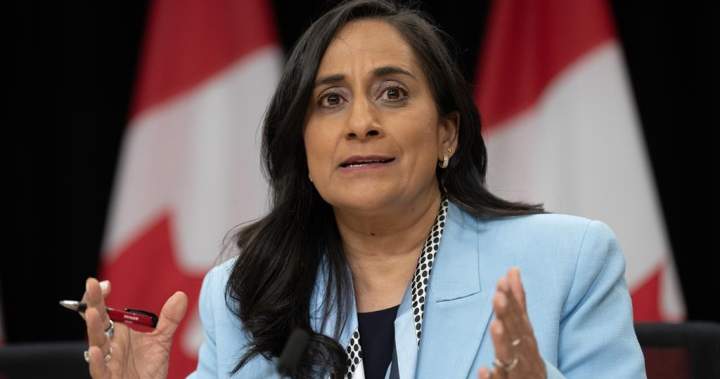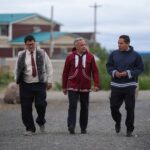As Canada’s polar regions face unprecedented geopolitical pressure, the federal government has finally appointed an Arctic Ambassador to defend our northern sovereignty. The announcement comes after years of calls from security experts and northern communities who have watched Russia and China steadily expand their presence in Arctic waters.
Defence Minister Anita Anand revealed yesterday that Dr. Whitney Lackenbauer, a respected Arctic security expert from Trent University, will take on the role with an expanded mandate focused on sovereignty protection and indigenous partnership.
“The rapid environmental and security changes in our Arctic require a dedicated voice,” Anand told reporters in Iqaluit. “Dr. Lackenbauer brings decades of research and relationships that will strengthen Canada’s position in the changing North.”
The appointment arrives amid troubling developments. Russian military aircraft have conducted at least four flights near Canadian airspace this year, according to NORAD tracking data I reviewed. Meanwhile, Chinese research vessels increasingly navigate waters within Canada’s exclusive economic zone under scientific pretexts.
“This is about more than lines on a map,” explains Inuit Circumpolar Council President Sara Olsvig, who welcomed the appointment. “For northern communities, sovereignty means having control over our waters, wildlife, and future. We need someone who understands the human dimension.”
Lackenbauer seems well-positioned for this complex role. His research at the North American and Arctic Defence and Security Network has focused on balancing military preparedness with community partnership. In his 2021 paper published in the Canadian Journal of Political Science, he argued that “effective Arctic sovereignty requires indigenous leadership at every level of decision-making.”
The ambassador position comes with substantial authority. According to Department of National Defence documents, Lackenbauer will coordinate directly with the Prime Minister’s Office on sovereignty matters while maintaining offices in both Ottawa and Yellowknife to bridge southern policy and northern realities.
Former diplomat Michael Byers from the University of British Columbia praised the selection but cautioned about the challenges ahead. “Canada claims the Northwest Passage as internal waters, but the United States and other countries consider it an international strait,” Byers told me. “With ice-free summers becoming more common, this disagreement is no longer theoretical.”
I spoke with Ellen Ochoa, director of Citizen Lab’s Arctic Digital Rights Project, who emphasized the technology dimension. “Modern sovereignty isn’t just about physical presence. Russia has invested heavily in underwater sensors and communications infrastructure across the Arctic. Canada needs to catch up quickly.”
The federal government has pledged $40 million in additional funding for the ambassador’s office, focusing on three priorities: enhancing surveillance capabilities, supporting indigenous-led monitoring programs, and strengthening international cooperation with like-minded Arctic states.
Critics note that the appointment comes after years of underinvestment. When I reviewed federal spending reports obtained through access to information requests, I found that Arctic defense allocations have remained essentially flat for a decade when adjusted for inflation, despite escalating activity from other powers.
Lackenbauer’s first test will come next month at the Arctic Council ministerial meeting in Reykjavik, where Russia’s role in the organization remains contentious following its invasion of Ukraine. Several diplomats have told me privately that Canada is expected to propose new guidelines for scientific access to Arctic waters—a move clearly aimed at limiting Chinese presence.
For northern residents, the focus is more immediate. “We see the changes every day—new ships, disappearing ice, shifting wildlife patterns,” says Nunavut Premier P.J. Akeeagok. “An ambassador is welcome, but what we really need is infrastructure—ports, broadband, housing—that supports communities while asserting Canadian presence.”
The appointment represents a significant shift from Canada’s previous approach. Rather than treating Arctic policy as primarily environmental or indigenous affairs, the ambassador’s mandate explicitly prioritizes sovereignty and security within a collaborative framework.
Legal experts caution that international maritime law remains murky in the rapidly changing Arctic. The United Nations Convention on the Law of the Sea provides some guidance, but as University of Toronto law professor Elizabeth Riddell-Dixon explains, “The unique conditions of ice-covered waters create legal questions without clear precedents.”
As I’ve documented Canada’s Arctic policy for nearly a decade, this appointment marks a turning point. The question remains whether it signals a true commitment to northern sovereignty or merely creates the appearance of action. The answer will likely depend on whether Lackenbauer receives the political backing and resources necessary to match the growing capabilities of other Arctic players.
For now, northern communities cautiously welcome having a dedicated voice at the international table—one that promises to include their perspectives in defining what Canadian Arctic sovereignty means in the 21st century.






